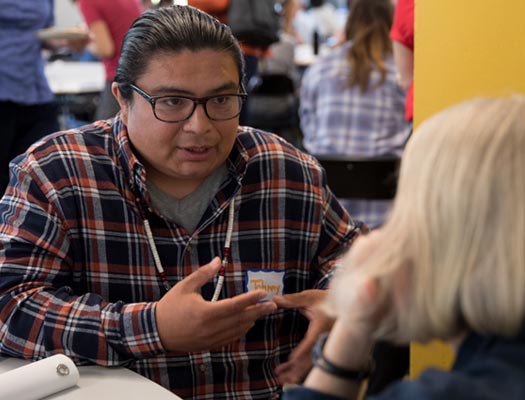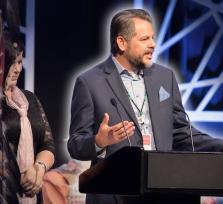There are several things students can do to prepare — and shine
For students envisioning a long and successful career in a chosen field, internships can be a great way to get a foot in the door and sample what it’s really like to work for that dream company. As competition for internships increases, however, it’s not as easy — or as simple — as applying and being accepted. It’s not uncommon to be required to complete at least one round of interviews before receiving an offer for an internship or spot in a program. To make sure you’re ready to shine, here are a few tips to help you prepare.
The most important step occurs ahead of the interview. Research the position, program, organization, and individuals scheduled to speak with you. Use resources such as LinkedIn, Google, Twitter, and the company website to learn as much as you can. Review sample interview questions to get a feel for what may be asked, and prepare several talking points for the interviewers to show them that you are truly interested in the opportunity and have done your homework. The research will also likely produce a few questions that you’ll want to bring up during the conversation. After all, in addition to making sure you’re the right fit for the company, the interview is about making sure the company is the right fit for you.
Be sure to dress appropriately for any in-person meeting. A good rule of thumb for interviewees is to dress one notch better than you’d be required to dress for the position. During your company research, you may discover that employees typically dress “business casual,” which is less formal than traditional business wear. In that case, it would make sense to dust off that little-used tie and perhaps a sport coat along with a freshly pressed button-down shirt, dress pants, dark socks, and nice shoes, or a combination of a skirt or dress slacks, blouse, sweater, and closed-toe shoes. Very few college students will have all these elements hanging in their closets. Don’t be afraid to borrow from one or more good friends. If you’re unsure about the outfit you’ve put together, just remember that it’s is far better to arrive at an interview overdressed than underdressed.
Don’t overlook the little things on the day of the interview. First impressions can make a big difference, and you want to know that you did everything in your power to set yourself up for success. Arrive on time, if not a few minutes early, treat anyone you see politely, and be sure your cell phone is turned off. Bring along a few copies of your resume as well as a notepad and pen. Greet the interviewer with a firm handshake and introduce yourself. Be aware of your posture, speak clearly and slowly, and maintain good eye contact. Now you’re ready to share all the wonderful things about yourself!
Many students find it hard to sell themselves, and feel that talking about their accomplishments is bragging. Kick that thought to the curb! Practicing ahead of time and being comfortable discussing your strengths and what you have worked hard to achieve will allow you to explain what you bring to the table that sets you apart. Don’t let this opportunity to highlight the amazing things you’ve done go unnoticed! Your interviewers can only get so much from your resume — and sometimes they haven’t had a chance to read it in detail before the interview — so don’t feel bad about highlighting your accomplishments. This is the best time to do it!
It’s important to show the interviewers that you want to work with them or for their company, as well as what exactly you can contribute. They’ll want to know why this particular internship or program is a good fit for you. Be sure to highlight your interest with specific details, as opposed to saying something more general such as, “It would be a good experience.” You should also take time in the interview to tell interviewers about your long-term goals, and how this opportunity will help you get there. The point of an internship is to gain experience, but to what end? Make sure interviewers understand where you envision your career heading, and how partnering with the company can help you get there.
Remember, interviews provide an opportunity to highlight your accomplishments and confirm that you truly are the best fit for the position. These meetings are a way to create a stronger connection with a potential employer — and to show them that you’re exactly what they’re looking for! Take advantage of the time and leave the interviewer with a clear picture of what you bring to the table, and what you hope to gain from the experience.
The interview is complete, and you’re happy with how everything went. It’s time to rest easy, right? Wrong! Don’t forget one crucial final step: thanking the people you spoke with for their time. This thank-you can be in the form of an old-fashioned handwritten note. At the very least, however, you should send a personalized email to everyone you spoke with. (It’s always a good idea to request a business card each time you’re introduced to someone during the interview. The cards come in handy for remembering names and titles, as well contact info.) In addition to thanking them for meeting with you, you can remind interviewers of your qualities, skills, and interest in the position, as well as why you would be a good fit for the company and its culture. Keep it brief, but take advantage of one last chance to shine. You’ve done a lot to be proud of!

Johnny Buck, Wanapum/Yakama, is currently pursuing his bachelor’s degree in Native environmental science at Northwest Indian College in Bellingham, Wash., and preparing applications for joint graduate programs in environmental engineering and business. An active father, family member, and mentor for Native youth, Buck also serves as a leader in many roles, including as co-founder of the Native Youth Leadership Alliance and board member for the Social Justice Fund Northwest. He has experience with the interview process and shares several tips for calming those nerves, highlighting important skills, and making a positive impression on the interviewer.
What is the most important thing a candidate can do to impress at an interview?
One major thing I had to work on was being comfortable talking about my accomplishments and strengths. At first it felt unnatural, like I was supposed to brag about myself. I made a mind-set shift and realized that sharing my strengths and assets is an act of confidence and self-respect, and being up-front about these doesn’t mean that I am not also humble.
I grew up very traditionally in my home village along the Columbia River in Washington State, and was blessed to be raised with many of my elders, who passed down our oral culture and cultural lifeways. This included the value for children to listen first more than to speak. For me, this meant I barely spoke until around age 10. I was always observing, listening, and repeating the behaviors of my elders. To say that I was shy is an understatement. I share this to help anyone who struggles with public speaking or speaking to people they may not be immediately comfortable with. I just kept challenging myself to speak up and to be outside my comfort zone. I also couldn’t say no when my elders encouraged me to speak in front of groups of people. I continuously am grateful that I’m able to build new relationships and connect with people in very unexpected places.
What can candidates do beforehand to impress at the interview?
It’s very important to be prepared. Research as much as you can about the position, about the school program, organization, company, etc. Get familiar and comfortable with how they talk about their work. Take time to learn about the interviewers and their own academic and career paths. This can help you better connect with them as people and also show that you take initiative and are aware of the unique aspects of the opportunity.
What are some tips for making a positive impression at an interview?
- Be comfortable talking about your accomplishments and strengths.
- Ask professors/mentors/colleagues to help you practice and prepare. Record yourself and listen/watch to see how you communicate. You’ll gain more self-awareness on how you can improve.
- Like taking care of any relationship, make sure to express gratitude for the opportunity to interview and be considered.
What are some ways a candidate can impress after an interview?
Send a follow-up thank-you note or email, and be patient. Cast your net wide, and the right opportunities will come. Keep up your courage and good work to expand your abilities and resources to better our communities.
What else is important for candidates to keep in mind if they want to impress at an interview?
Congratulations on your upcoming interview opportunities! It is powerful to put yourself out there and to step outside your comfort zone. The good news is, many of the qualities that make for a good impression in interviewing are within our traditional cultures — such as understanding the value of relationships and having respect for ourselves and for others. Aiming high to experience new things that can better your life and the lives of our communities is the type of leadership our Native communities need.














